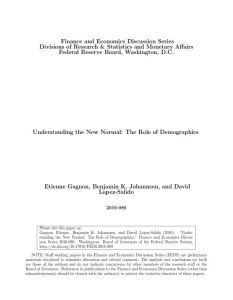Join getAbstract to access the summary!

Join getAbstract to access the summary!
Etienne Gagnon, Benjamin K. Johannsen and David Lopez-Salido
Understanding the New Normal
The Role of Demographics
Federal Reserve Board, 2016
What's inside?
The US’s slow economic growth and low interest rates are now the “new normal.”
Recommendation
GDP growth in the United States continues to slog forward at a pace far below its long-run historical average of about 3% annually in the years following World War II. Particularly troubling is the anemic recovery following the Great Recession. Despite the Federal Reserve’s attempts to boost the economy, strong GDP growth remains elusive. Economists Etienne Gagnon, Benjamin K. Johannsen and David Lopez-Salido contend that constrained US growth is the result of an entirely predictable outcome based on demographic patterns. getAbstract recommends their scholarly report to executives and investors interested in understanding this “new normal.”
Summary
About the Authors
Etienne Gagnon, Benjamin K. Johannsen and David Lopez-Salido are economists with the Board of Governors of the Federal Reserve System.


















Comment on this summary